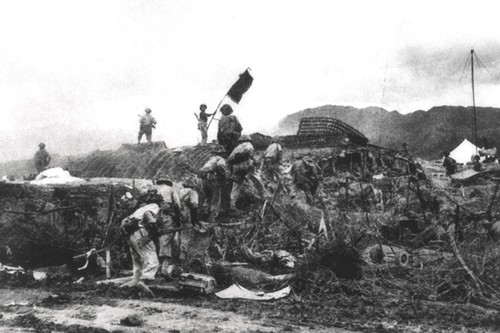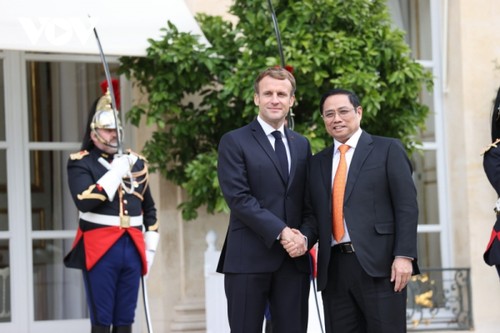 A Vietnamese soldier waves a national flag on top of a French command post at Dien Bien Phu on May 7, 1954. (photo: AFP) A Vietnamese soldier waves a national flag on top of a French command post at Dien Bien Phu on May 7, 1954. (photo: AFP) |
The Dien Bien Phu Victory in 1954 ended a century of ceaseless struggle by the Vietnamese people against the domination of the French colonialists. The victory set the stage for Vietnam’s eventual national unification.
A resounding victory
Dien Bien Phu was one of the greatest battles of the 20th century. The victory is mentioned in many history books. It smashed the French military efforts and American intervention, and forced the French government to sign the Geneva Accords in July 1954, recognizing the independence, sovereignty, unity, and territorial integrity of three Indochina countries, ending centuries-long French colonial rule, and opening a new chapter in the revolution of Vietnam, Laos, and Cambodia.
The Dien Bien Phu Victory forced the French to respect the rights of other nations and acknowledge the autonomy or independence of many African countries.
Analyzing the Dien Bien Phu Victory, historians say there were principal factors: a clear strategy and clever tactics, brave troops, and solid logistics. French historian Ivan Cadeau, author of “Dien Bien Phu: 13 March – 7 May 1954", said: “The historic victory was a result of many factors. The ingenuity of the Vietnamese government was able to utilize and mobilize all resources and the strength of the entire people and army. I want to emphasize the role of engineering and heavy anti-aircraft artillery forces to destroy the runway and cut off the French army's supply line to Dien Bien Phu. Secondly, the Viet Minh Staff had a very flexible attack strategy that the French could not predict. One more point is that the Vietnamese army used their limited weapons very effectively. The Dien Bien Phu Victory was a classic military operation.”
 Prime Minister Pham Minh Chinh meets French President Emmanuel Macron in Paris in November, 2021 (photo: VOV) Prime Minister Pham Minh Chinh meets French President Emmanuel Macron in Paris in November, 2021 (photo: VOV) |
Toward the future
Vietnam and France have been building a strong relationship based on deep ties between the two nations. France has been Vietnam’s strategic partner since 2013. The relationship is based on regular consultations and close cooperation in culture, security, health, and language. Hanoi's metro line 3, for which France put up 500 million euros, is expected to begin operation late this year. The two countries have supported each other during the COVID-19 pandemic. Vietnam gave masks to France in 2020 and France gave Vietnam 2 million doses of vaccine in 2021, and more this year. The French Development Agency (AFD) provided a loan for the expanded Hoa Binh Hydropower Plant Project and for reducing greenhouse gas emissions in power generation.
Vietnam and France have cooperated in science and technology. An agreement was signed in November, 2021 between the Vietnam Academy of Science and Technology, the French National Center for Space Research, and Airbus.
Prime Minister Pham Minh Chinh’s visit to France in November, 2021 was a testament to good bilateral relations.
Foreign Minister Bui Thanh Son said: “The leaders of both countries agree that an annual action plan is needed to carry out the Vietnam-France strategic partnership. The action plan will cover politics, diplomacy, defense, security, economy, trade, investment, culture, education, and health. I believe the Vietnam-France strategic partnership will continue to grow.”
In 2023 Vietnam and France will celebrate the 50th anniversary of their diplomatic relations and the 10th anniversary of their strategic partnership. They have overcome their past and built an increasingly important friendly relationship.